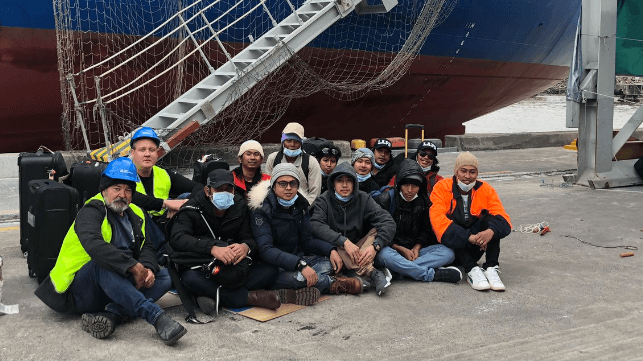Opinion: RightShip's Crew Welfare Assessment Falls Short

In our view, the RightShip Crew Welfare Self-Assessment Tool does not meet basic tests for public transparency, accountability, or remediation. Its self-certification process fails to identify and report cases of egregious abuse and abusers through transparent public disclosure.
Background
Launched in October 2021 by SSI, the Seafarers Code of Conduct and integrated self-assessment tool were developed by industry group SSI and the Institute of Human Rights and Business (IHRB) in association with the Rafto Foundation.
The Code states that “the initiative aims to support a safe, healthy and secure onboard work environment, and goes beyond the ILO Maritime Labour Convention (MLC) to focus on the full spectrum of seafarers’ rights and wellbeing.”
As an integral part of the Code’s promulgation, RightShip launched a crew welfare self-assessment tool. The platform states that it provides guidance on how to adopt the Code of Conduct, as well as how to track progress against three levels of accreditation: basic, intermediate, and excellent. This results in the entity receiving a crew welfare badge to “showcase crew welfare commitment."
Unfortunately, the crew welfare badge accreditation is meaningless without independent oversight and transparent reported benchmarking that demonstrates client improvements on a case-by-case basis. Further, the accreditation cannot be deemed credible if it cannot and will not address cases of human or labor rights abuse due to commercial considerations.
Flawed data collection
In its current form, the self-assessment tool collates data submitted by client company employees. It is unlikely that a company representative will submit any issues of concern, including abuses of human and labor rights, due to a clear conflict of interest and concerns over adverse publicity for the representative’s own employer.
Further, the level of seafarer rights training, awareness, and experience of the individuals submitting the reports is unclear.
Lack of transparency
RightShip makes it clear on their website that “data submitted via the RightShip Crew Welfare Tool is not reviewed nor verified and will not affect your RightShip Safety Score, GHG Rating, Vessel Vetting process or Dry Bulk Inspection outcomes.”
Further, it states that “self-assessments are stored securely in our cloud, with individual responses not shared with third parties outside your company.”
At the launch webinar in October 2020 - which is no longer available to view online - such issues were raised in relation to transparency, reporting, routes to effective remedy and accountability. During the launch, the International Transport Workers Federation (ITF) also questioned the validity of self-assessment.
In short, there is a lack of transparency or accountability due to the lack of review or verification by independent human rights experts outside of the involved stakeholders. This is compounded by the fact that adverse welfare data does not impact any other aspect of vessel rating by RightShip.
Points of concern and clarification
Human Rights at Sea has raised questions for clarification to SSI, and at the time of writing it awaits clarifying responses and assurances for addressing improvements. These questions include:
- How will SSI and/or IHRB record and hold accountable any entity's failure to improve year-on-year through the annual IHRB report?
- Will SSI and/or RightShip hold to account RightShip clients who are found to have fallen short? If so, how?
- How will SSI and IHRB be able to demonstrate that those persons who completed the self-assessment form are themselves not conflicted in their reporting as employees of the company?
- How is worker's voice included and represented in the self-assessment process?
- How will the self-assessments be independently validated and verified, thereby avoiding conflicts of interest in the development and assessment process?
Reporting of cases of abuse
RightShip has pursued one known case of abuse publicly, though had alerted Human Rights at Sea to at least one other case in 2020. In May 2020, in coordination with Human Rights at Sea, it acted decisively in the investigation by the South African Maritime Safety Authority (SAMSA) and local police into the attempted murder of two Tanzanian stowaways by the crew of the Panamanian flagged bulker MV Top Grace in March 2020.
Hong Kong-based Fairweather Steamship Co Ltd, who managed the fleet of five vessels, had its ratings cut by RightShip and was placed on the high-risk list in response to the incident. Remediation was undertaken, but details about the case subsequently became difficult to obtain, and no further incidents were shared.
Need for transparency and improvement
As it stands, the development of the SSI Code of Conduct is welcomed. Our independent NGO was engaged by SSI at the start of the process. In comparison, the RightShip Crew Welfare Self-Assessment Tool is based on unverified self-assessment statements made by employees of the very companies being awarded a crew welfare badge accreditation. The conflict of interest is unambiguous.
Unless SSI members, including RightShip, can categorically and publicly state that the self-assessment tool will become transparent and accountable in its reporting, this initiative can only be viewed as a data collection exercise. It is urged that this exercise must be urgently reviewed.
To become trustworthy, the RightShip Tool and accreditation must focus on public transparency, accountability, and facilitating the bringing of violators of human rights abuse to justice without delay through existing legislative protections.
Human Rights at Sea supports the work undertaken on the Code of Conduct, but it cannot support the Crew Welfare Self-Assessment Tool as it currently stands without undermining our vision to end human rights abuse at sea. SSI members are urged to reflect and act accordingly.
Statement on Conflict of Interest: In 2019 and 2020, Human Rights at Sea received unrestricted donations towards core costs by RightShip. The charitable NGO no longer receives any funding nor support from RightShip.
The opinions expressed herein are the author's and not necessarily those of The Maritime Executive.
